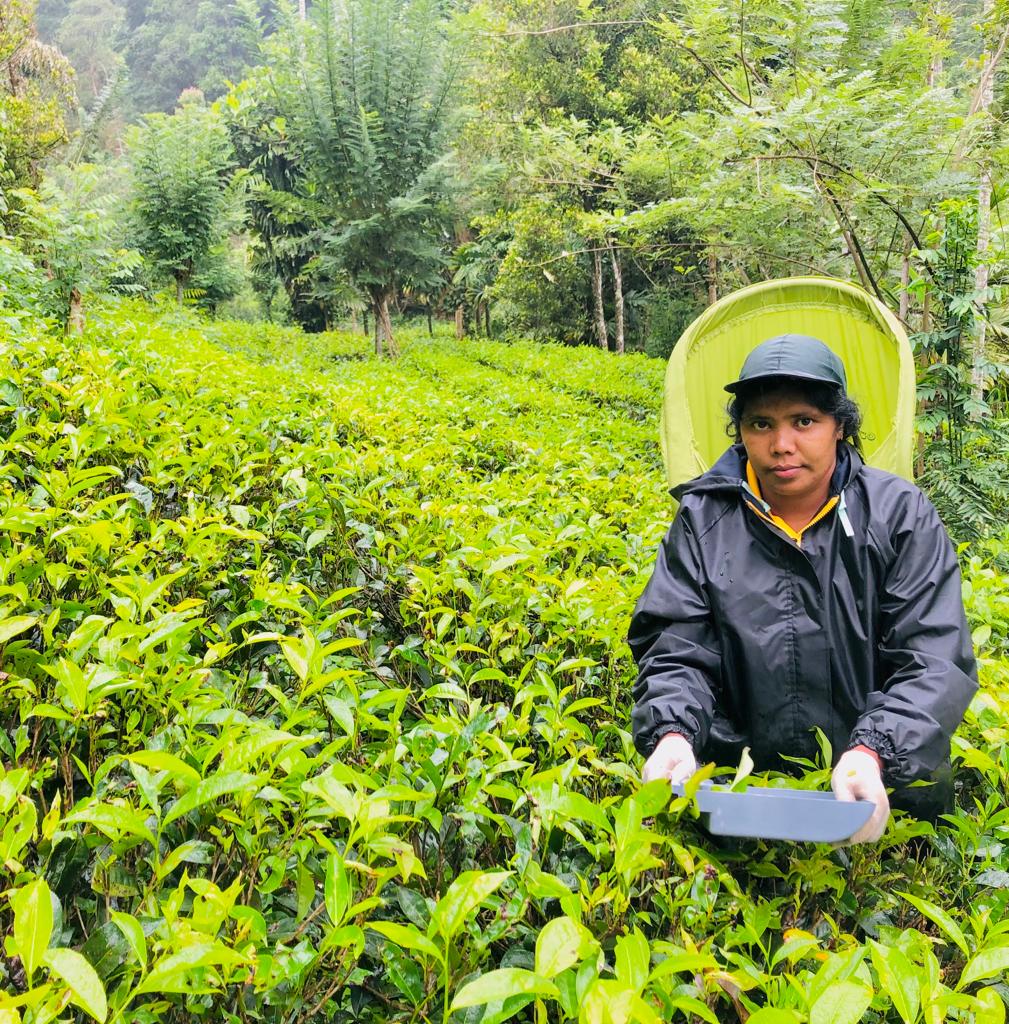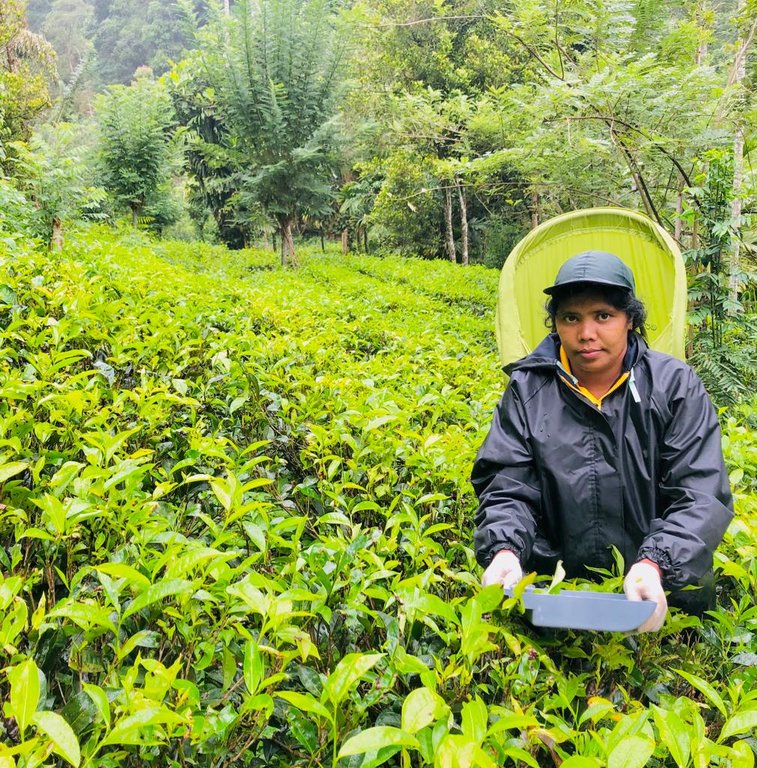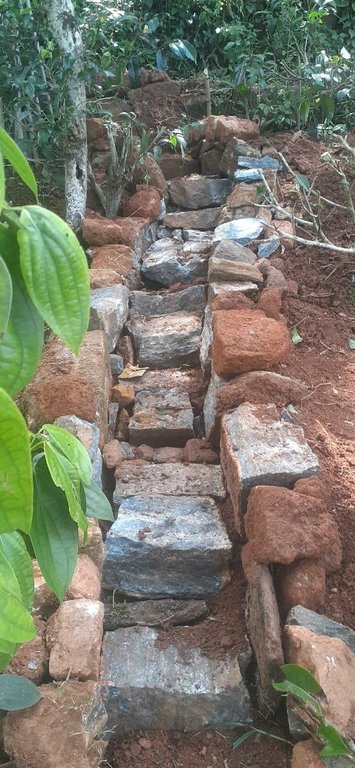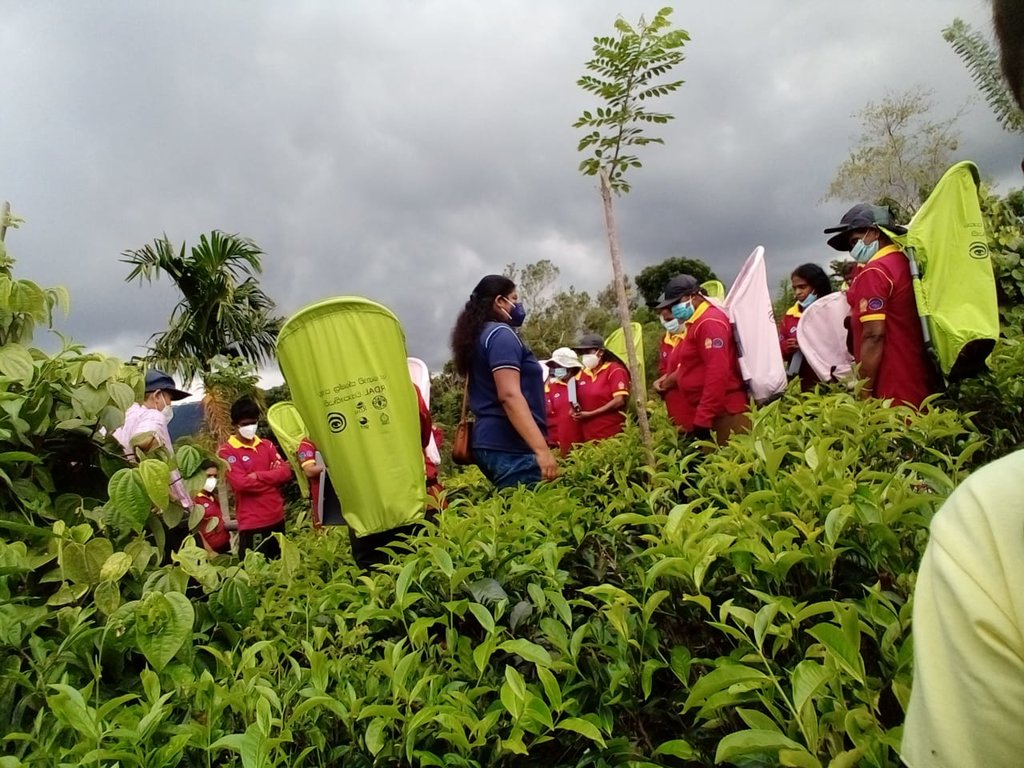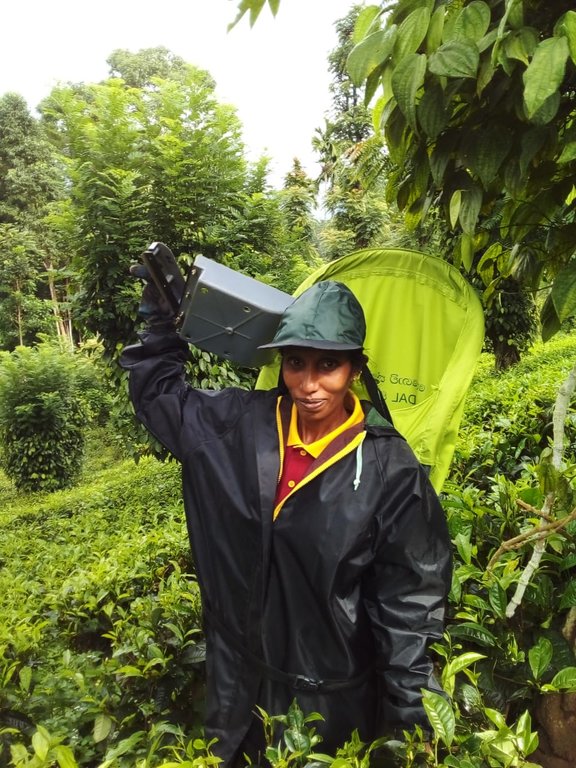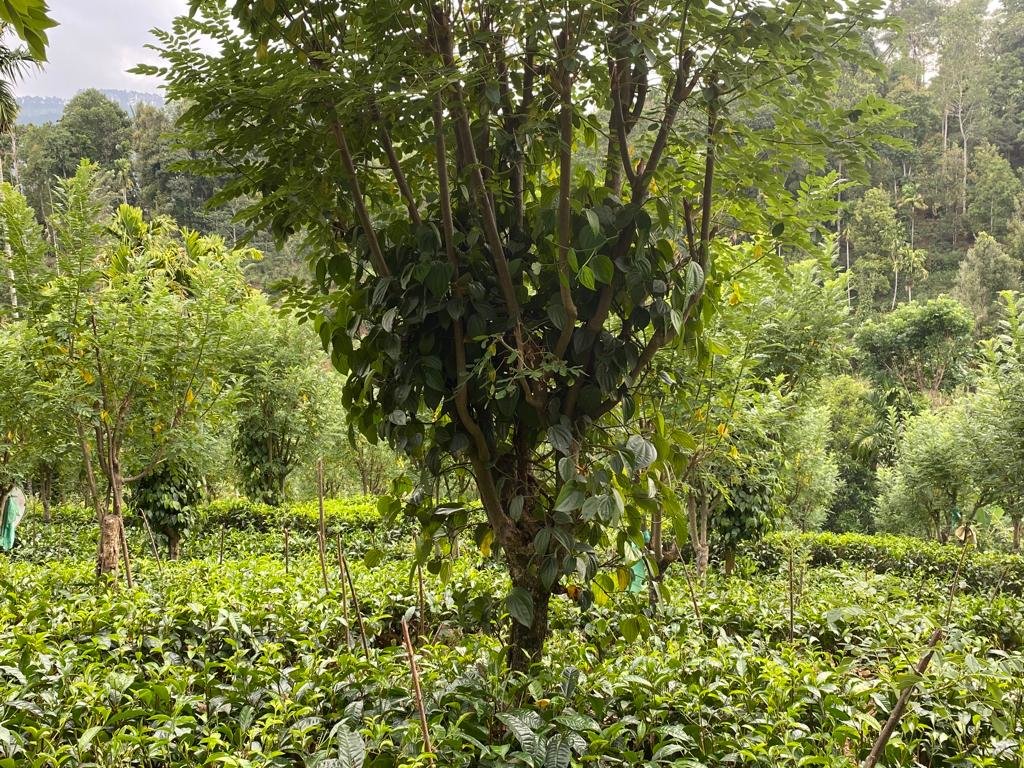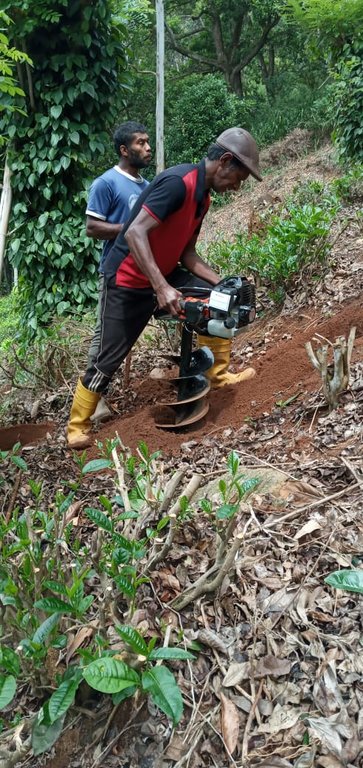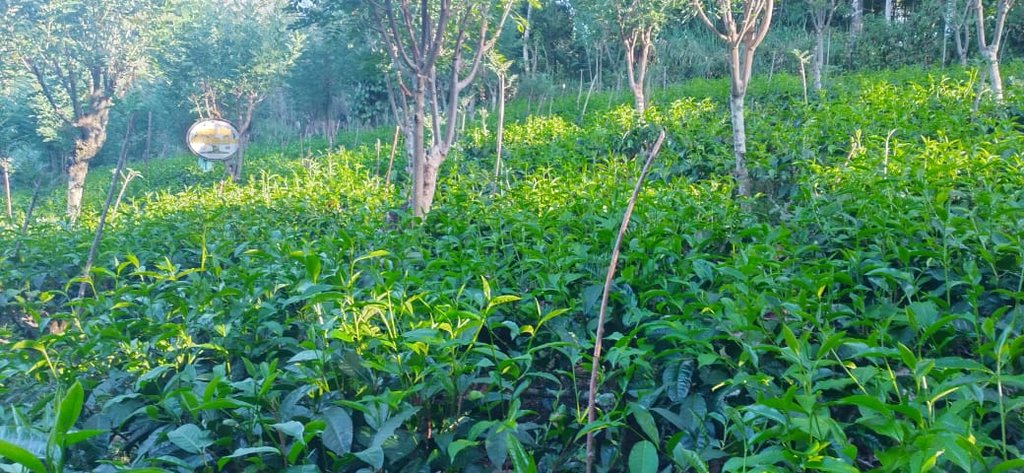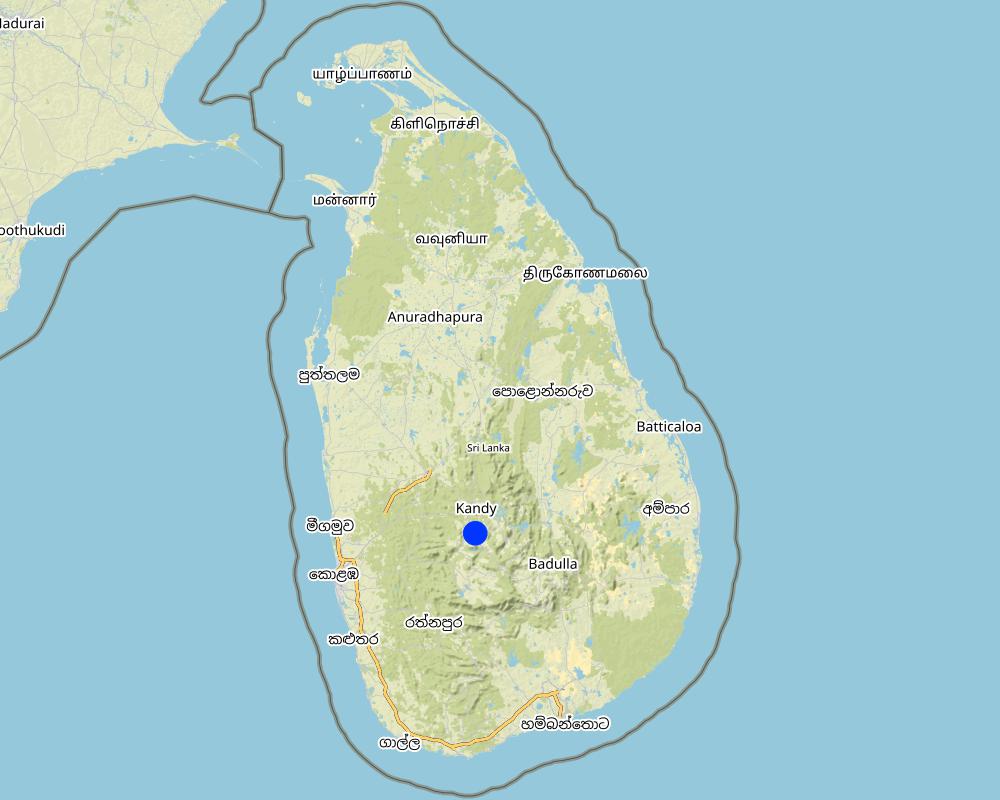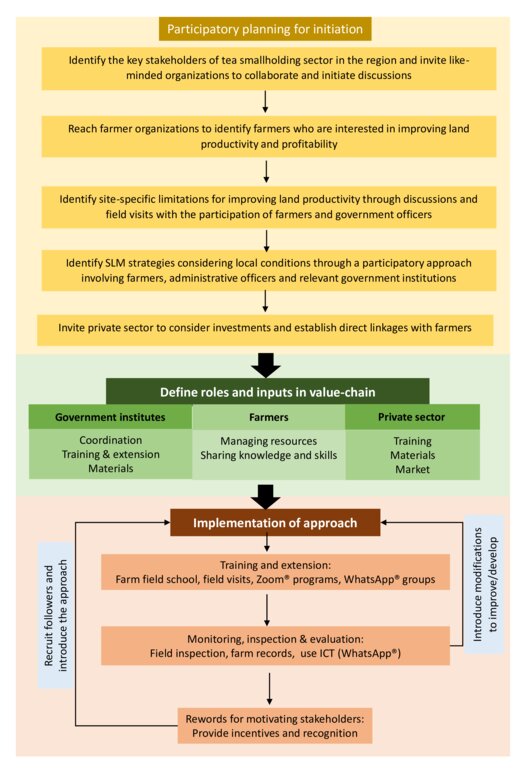Inter-sectoral collaboration for sustainable land management in tea smallholdings [Sri Lanka]
- Criação:
- Atualização:
- Compilador/a: Head Soil Science
- Editor: –
- Revisores: William Critchley, Rima Mekdaschi Studer
Inter-sectoral collaboration for sustainable land management in tea smallholdings
approaches_6182 - Sri Lanka
Veja as seções
Expandir tudo Recolher tudo1. Informação geral
1.2 Detalhes do contato das pessoas capacitadas e instituições envolvidas na avaliação e documentação da abordagem
co-compilador/a:
co-compilador/a:
Agrarian Research and Production Assistant:
Iroshini Senevirathna
+94778278582
iroshinisenavirathna@gmail.com
Department of Agrarian Development
Agrarian Research and Production Assistant Office, "Nila Sewana", Pambadeniya
Sri Lanka
usuário de terra:
Pushpa Ranjani
+94767817221
“Sithamu Ranliya” farmer's organization
Pambadeniya, Panvilathanna
Sri Lanka
Nome do projeto que facilitou a documentação/avaliação da Abordagem (se relevante)
Rehabilitation of Degraded Agricultural Lands in Kandy, Badulla and Nuwara Eliya Districts in the Central Highlands of Sri LankaNome da(s) instituição(ões) que facilitou(ram) a documentação/avaliação da Abordagem (se relevante)
Faculty of Agriculture, University of Peradeniya, Sri Lanka (AGRI.PDN) - Sri Lanka1.3 Condições em relação ao uso da informação documentada através de WOCAT
Quando os dados foram compilados (no campo)?
25/02/2022
O/a compilador/a e a(s) pessoa(s) capacitada(s) aceitam as condições relativas ao uso de dados documentados através da WOCAT:
Sim
2. Descrição da abordagem de GST
2.1 Descrição curta da abordagem
Participatory land restoration with the collective efforts of different stakeholders can assure sustainable use of land-resources. This approach promoted sustainable land management technologies such as agroforestry, soil conservation, and soil fertility enhancement practices through inter-sectoral collaboration, including the use of digital tools and Farmer Field Schools (FFS) to provide training and resources, disseminate knowledge, improve market-orientation of farmers, and monitor and evaluate the progress of activities for rehabilitating and increasing the productivity of degraded tea smallholdings in the Central Highlands of Sri Lanka.
2.2 Descrição detalhada da abordagem
Descrição detalhada da abordagem:
Due to unsustainable land management practices the monthly average green-leaf yield of tea smallholdings in Maligamale watershed in the Central Highlands of Sri Lanka is as low as 1000 kg/hectare, whereas the potential is 2400 kg/hectare. Soil erosion, soil fertility decline, low plant density, and poor shade management are among the main reasons for low productivity. This causes reduced household incomes and farmers’ ability to invest in sustainable land management (SLM) practices. Inefficiencies in top-down extension methodology, lack of awareness and training on tea cultivation techniques, poor business practices, lack of access to services and poor perceptions about SLM have reduced profit margins of tea smallholdings. Hence, the aim/ objectives of the approach are to increase the land productivity in tea smallholdings and increase farmer’s incomes and gain environmental benefits through proper implementation of SLM practices. To address this, the Rehabilitation of Degraded Agricultural Land Project (RDALP) introduced a participatory approach together with Tea Smallholdings Development Authority (TSHDA), Department of Agrarian Development and other relevant government institutions, the private sector and farming community. The approach considered methods for strengthening linkages between stakeholder groups, providing training and resources for SLM practices, enhancing market orientation, using ICT for knowledge sharing, monitoring and evaluation, improving perceptions of farming community on agriculture and enhancing food-security of the households.
Firstly, tea smallholders who volunteered to learn about SLM were linked with the experts to collectively develop a participatory land restoration proposal. Site specific limitations for productivity improvement, recommendations, roles of different stakeholders, and training and material needs were identified in the proposal. The existing institutional setup was used for coordination of activities. The experts from government institutes provided training on SLM through farmer field schools, field demonstrations and ICT tools. More specifically, farmers were educated on soil conservation and soil fertility management practices: these included producing organic fertilizers using locally available resources, building live fences with green-manure crops and edible crops, intercropping using export agriculture crops, in-filling, selective weeding, developing and maintaining nurseries, using machinery for cutting pits and harvesting, using safety measures during field operations, and shade tree management. In addition, farmers have been encouraged to share good-practices, keep records and practice soil test-based decision making for nutrient management. Farmers and officers effectively used WhatsApp®, Zoom® and Facebook® for knowledge sharing and for monitoring and evaluating progress. Dissemination of knowledge using ICT and performance-based rewarding helped to recruit more farmers as followers. The TSHDA supported with extension service and regular monitoring of progress. With the support of government institutes, farmers were linked with private sector companies to promote market orientation. Export agriculture crops such as peppers, vanilla, areca nut and cloves were successfully incorporated into tea smallholding landscape, allowing farmers to earn an extra income. The partners from the private sector provided planting materials and extension services to transfer necessary knowledge and skills to the farmers. Machinery was provided to farmer organizations for the members to share.
Improving profitability of farming, improving hygiene and safety of farmers, and reducing time spent on agronomic practices have uplifted the living-status of famers and increased their willingness to invest in SLM. These characters could attract youth to the sector.
2.3 Fotos da abordagem
2.4 Vídeos da abordagem
Comentários, breve descrição:
https://www.youtube.com/watch?v=SU3--fHKY1k
Application of ICT for knowledge dissemination and agricultural extension service
Data:
20/07/2021
Localização:
Pambadeniya, Panvilathanna
2.5 País/região/locais onde a abordagem foi aplicada
País:
Sri Lanka
Região/Estado/Província:
Kandy District- Central Province
Especificação adicional de localização:
Pambadeniya village
Comentários:
The region is in the Maligamale watershed in the Central Highlands of Sri Lanka.
Map
×2.6 Datas de início e término da abordagem
Indique o ano de início:
2017
Comentários:
Approach is still carrying out by land user
2.7 Tipo de abordagem
- Baseado em projeto/programa
2.8 Principais metas/objetivos da abordagem
The aims/ objectives of the approach are to increase the land productivity in tea smallholdings and increase farmers' income and environmental benefits through proper implementation of SLM practices.
2.9 Condição que propiciam ou inibem a implementação de tecnologia/tecnologias aplicada(s) segundo a abordagem
Normas e valores sociais/culturais/religiosos
- Propício
Increased livelihood requirements and access to education, market and health services
- Inibitivo
Migration of youth and males to cities
Disponibilidade/acesso a recursos e serviços financeiros
- Propício
Providing funds/ subsidies has increased the access to financial resources (subsidy schemes of TSHDA, Loan facilities of tea factories)
- Inibitivo
Access of farmers to resources is limited by their financial situation as well as geographic location.
Quadro institucional
- Propício
An institutional set-up for facilitating the approach already exists and all technical support is providing by institutes
- Inibitivo
Mandate of some institutions are not clearly defined. Decision making is very often a top-down approach
Colaboração/coordenção de atores
- Propício
Institutes have some level of collaboration
- Inibitivo
There is lack of motivation to initiate collaboration and the level of collaboration depends on the commitments of the officers. Institutional mechanisms do not encourage the collaborations
Quadro jurídico (posse de terra, direitos de uso da terra e da água)
- Propício
Some land users own their land
- Inibitivo
Some lands used by farmers are owned by the state and there are issues on land rights. Water availability is problematic to farmers as the crop is maintained as a rainfed crop. In the region, drinking water is supplied in ten days interval during dry-months
Políticas
- Propício
National soil conservation act
- Inibitivo
Implementation of policies to action is very low
Governança da terra (tomada de decisões, implementação e aplicação)
- Propício
Farmers participated in the decision-making process related to land management. Land is maintained based on the advice given under the approach. Most of the technologies introduced were not gender biased and therefore, involvement of women in management practices increased
- Inibitivo
Dependence on males is high for agronomic practices in tea-cultivation
Conhecimento sobre GST, acesso a suporte técnico
- Propício
Farmers were guided through farmer training programs, practical sessions, farmer field schools, Zoom® meetings, sharing knowledge through WhatsApp® groups and Facebook.
- Inibitivo
Shortage of tea extension officers
Mercados (para comprar entradas, vender produtos) e preços
- Propício
Private companies come to fields to purchase products and they provide extension support and material inputs to some extent to the farmers who have established links with them
- Inibitivo
Market orientation of farmers is low and their ability to negotiate prices is poor due to various factors
Carga de trabalho, disponibilidade de força de trabalho
- Propício
Labour resources are available. Introduction of machinery created shared responsibilities and reduced labour demand while creating an income source for the farmer organizations. Decent working environment with safety kits and machineries will encourage the labour force to remain in the sector
- Inibitivo
Labour force continuously moving away from the industry
3. Participação e papel das partes interessadas envolvidas
3.1 Partes interessadas envolvidas na abordagem e seus papéis
- Usuários de terra/comunidades locais
Men and women farmers are involved in tea cultivation
They involved in practicing SLM technologies as the technologies were not gender biased. But the operation of mechanical weeder and auger for infilling are mainly done by male farmers.
- Organizações comunitárias
Farmer organizations
Support coordination of activities with farmers
Support Farmer Field Schools
Maintain common equipment and rent for members and non-members to support SLM practices
- Especialistas em GST/ consultor agrícola
Tea Smallholding Development Authority, Department of Agrarian Development, Department of Export Agriculture, Department of Agriculture
Provide tea plants for infilling, promote inter-cropping and provide technical guidance to farmers
Serve as resource-persons in Farmer Field Schools and in WhatsApp® groups
- Pesquisadores
University of Uva Wellassa, Sri Lanka
Study the effectiveness of knowledge dissemination approach and effectiveness of some SLM technologies
- Setor privado
Several private sector companies are involved (Bio Food (Pvt) Ltd, Adamjee Lukmanjee (Pvt) Ltd)
Buying products, providing planting materials and continuing extension services to transfer necessary knowledge and skills to the farmers who are linked with them
- Governo local
Local government institutes are involved in the process (Tea Smallholdings Development Authority (TSHDA), Department of Agrarian Development, Department of Agriculture, Department of Export Agriculture, Divisional Secretariat office- Doluwa
Capacity building, advisory services on fertilizer usage, land management, crop selection etc.
- Governo nacional (planejadores, responsáveis pelas decisões)
Ministry of Environment
Helps to raise awareness among private and government sector stakeholders and within communities about SLM approaches and technologies,
Project coordination and partial financial support
- Organização internacional
Food and Agriculture Organization of the United Nations
Project coordination, partial financial support and capacity building
Caso várias partes interessadas foram envolvidas, indique a agência líder:
Tea Smallholdings Development Authority (TSHDA)
3.2 Envolvimento do usuários de terra/comunidades locais nas diferentes fases da abordagem
| Envolvimento do usuários de terra/comunidades locais | Especifique quem estava envolvido e descreva as atividades | |
|---|---|---|
| Iniciação/motivação | Participativo | Government agencies, representatives from farmer organizations, RDALP team. Discussions to develop participatory land use plans for a region and identify the sectors to be developed |
| Planejamento | Participativo | Government agencies, representatives from farmer organizations, RDALP team Discussions, site visits and field programs to identify factors limiting land productivity and implementation of SLM practices Identify strategies to address these limitations Identify how the private sector can contribute and invite them to invest |
| Implementação | Participativo | Government agencies, leaders of farmer organizations, farmers, RDALP team, private sector companies Training and dissemination of knowledge through demonstrations, farmer training programs, farmer field schools Progress monitoring and evaluation Provide advisory services to farmers as needed Conduct performance-based rewarding to motivate the practitioners and to recruit followers |
| Monitoramento/avaliação | Participativo | TSHDA, RDALP team, farmers, private sector companies make observations in fields, guiding land users, exchange photos through whatsapp® Some private sector companies also involve in monitoring and field evaluating process (Adamjee Lukmanjee (Pvt) Ltd) |
3.3 Fluxograma (se disponível)
Descrição:
Before implementing the approach the level of productivity of tea lands that belong to the farmers who participated in the project were in class ‘C’ and below. In this scale of productivity lands were classified from A to D where A is the best and D is the worst. After implementation of the approach most of the fields upgraded to ‘A’ and ‘B’ performance levels. An interview conducted with a farmer revealed that the average green-leaf tea yield before and after participating in the approach were 1000 kg/ha/month and 2400 kg/ha/month, respectively.
Autor:
Warshi S. Dandeniya
3.4 Decisão sobre a seleção de tecnologia/tecnologias de GST
Especifique quem decidiu sobre a seleção de tecnologia/tecnologias a serem implementadas:
- todos os atores relevantes, como parte de uma abordagem participativa
Especifique em que base foram tomadas as decisões:
- Avaliação de conhecimento bem documentado de GST (tomada de decisão baseada em evidências)
- Resultados de pesquisa
- Experiência pessoal e opiniões (não documentado)
4. Suporte técnico, reforço das capacidades e gestão do conhecimento
4.1 Reforço das capacidades/ formação
Foi oferecida formação aos usuários da terra/outras partes interessadas?
Sim
Especifique quem foi capacitado:
- Usuários de terra
- Equipe de campo/consultores
Caso seja relevante, especifique gênero, idade, status, etnia, etc.
Training was provided for both men and women; age between 20-70 years old
Tipo de formação:
- Agricultor para agricultor
- Áreas de demonstração
- Reuniões públicas
- Cursos
Tipo de formação:
- Zoom discussions, Farm Field Schools
Assuntos abordados:
Soil conservation practices, intercropping in tea lands, organic fertilizer preparation (compost tea, vermi- compost), burying of pruned plant parts, infilling, documentation, improving tea buds quality and quantity, handling of machines for cutting pits and tea plucking
Comentários:
Farmer trainings are much important to spread easy agronomic practices and scientific knowledge to farmers
4.2 Serviço de consultoria
Os usuários de terra têm acesso a um serviço de consultoria?
Sim
Especifique se foi oferecido serviço de consultoria:
- nas áreas dos usuários da terra
Descreva/comentários:
Demonstration, advisory service was carried out through: government extension system, agricultural instructors and some private sector companies such as Adamjee Lukmanjee (Pvt) Ltd company which is giving support to enhance vanilla cultivation as an intercrop
4.3 Fortalecimento da instituição (desenvolvimento organizacional)
As instituições foram fortalecidas ou estabelecidas através da abordagem?
- Sim, moderadamente
Especifique a que nível (níveis) as instituições foram fortalecidas ou estabelecidas:
- Local
Especifique o tipo de apoio:
- Reforço das capacidades/ formação
- Equipamento
- providing safety kits and tea plants for infilling
Dê mais detalhes:
Organizing and conducting training programs, providing machineries for tea plucking and cutting pits, distribute safety kits among land users
4.4 Monitoramento e avaliação
Monitoramento e avaliação são partes da abordagem?
Sim
Caso afirmativo, esta documentação é destinada a ser utilizada para monitoramento e avaliação?
Não
4.5 Pesquisa
A pesquisa foi parte da abordagem?
Sim
Especifique os tópicos:
- Tecnologia
5. Financiamento e apoio material externo
5.1 Orçamento anual para o componente de GST da abordagem
Caso o orçamento exato seja desconhecido, indique a faixa:
- 100.000-1.000.000
5.2 Apoio financeiro/material concedido aos usuários da terra
Os usuários da terra receberam apoio financeiro/material para a implementação de tecnologia/tecnologias?
Sim
Caso afirmativo, especifique tipo(s) de apoio, condições e fornecedor(es):
Provide machinery for cutting pits and plucking, safety kits and tea plants for infilling as material support, provide financial support for soil testing, to add liming material for correcting soil pH for those who performed soil testing
The material and financial support was provided by RDALP team with contributions from TSHDA and private sector based on performance evaluation
5.3 Subsídios para entradas específicas (incluindo mão-de-obra)
- Equipamento
| Especifique quais entradas foram subsidiadas | Em que medida | Especifique os subsídios |
|---|---|---|
| Maquinário | Totalmente financiado | Tea plucking machines, grass cutting machines and machine for cutting pits in tea lands |
| Ferramentas | Totalmente financiado | Tea buds collecting buckets |
- Agrícola
| Especifique quais entradas foram subsidiadas | Em que medida | Especifique os subsídios |
|---|---|---|
| Planting materials, liming materials | Totalmente financiado | Tea plants for infilling, liming materials to correct soil pH, soil testing service |
- Outro
| Outros (especifique) | Em que medida | Especifique os subsídios |
|---|---|---|
| Safety kits | Totalmente financiado |
Se a mão-de-obra pelos usuários da terra foi uma entrada substancial, isso foi:
- Voluntário
Comentários:
Most of the time family members are engaged with field activities and hire labour for tea plucking
5.4 Crédito
Foi concedido crédito segundo a abordagem para atividades de GST?
Não
5.5 Outros incentivos ou instrumentos
Foram utilizados outros incentivos ou instrumentos para promover a implementação das tecnologias de GST?
Sim
6. Análise de impactos e declarações finais
6.1 Impactos da abordagem
A abordagem concedeu autonomia aos usuários locais de terra, melhorou a participação das partes interessadas?
- Não
- Sim, pouco
- Sim, moderadamente
- Sim, significativamente
Application of organic fertilizers such as compost tea, vermi-compost enhance the market value and some farmers ventured into organic tea production
A abordagem propiciou a tomada de decisão baseada em evidências?
- Não
- Sim, pouco
- Sim, moderadamente
- Sim, significativamente
Participatory approach in all stages of the project and farmer field schools encouraged the farmers and officers for evidence-based decision making. This also helped to recruit followers for the approach.
A abordagem auxiliou os usuários da terra a implementar e manter as tecnologias de GST?
- Não
- Sim, pouco
- Sim, moderadamente
- Sim, significativamente
Approach helps to maintain better environment within the community as it introduced practices that improved safety and hygiene of the farmers while being more efficient. Farmers have been maintaining the SLM technologies
A abordagem melhorou a coordenação e a implementação economicamente eficiente da GST?
- Não
- Sim, pouco
- Sim, moderadamente
- Sim, significativamente
Approach used existing institutional set-up and farmer organizations to coordinate the activities. Therefore, it was cost effective and helped to strengthen the collaborations between stakeholders
A abordagem mobilizou/melhorou o acesso aos recursos financeiros para implementação da GST?
- Não
- Sim, pouco
- Sim, moderadamente
- Sim, significativamente
Introducing private sector collaborations and improving market orientation of farmers helped to attract financial support to maintain sustainability of the approach
A abordagem aprimorou o conhecimento e as capacidades dos usuários da terra para implementar a GST?
- Não
- Sim, pouco
- Sim, moderadamente
- Sim, significativamente
Approach improved the knowledge and capacity of practitioners. Although only about 25 farmers attended farmer field school the number of farmers who joined WhatsApp group is high as 70. Farmers are sharing knowledge and experiences and were able to improve land productivity through the approach
A abordagem aprimorou o conhecimento e as capacidades de outras partes interessadas?
- Não
- Sim, pouco
- Sim, moderadamente
- Sim, significativamente
The knowledge and capacities of other stakeholders were improved similarly. Several officers were trained on SLM practices and technologies, use of ICT for extension, etc
A abordagem construiu/fortaleceu instituições, colaboração entre partes interessadas?
- Não
- Sim, pouco
- Sim, moderadamente
- Sim, significativamente
Approach helps to strengthen the collaboration between institutes and stakeholders
A abordagem atenuou conflitos?
- Não
- Sim, pouco
- Sim, moderadamente
- Sim, significativamente
Improving communication through the project supported the stakeholders to build healthy relationships.
A abordagem concedeu autonomia aos grupos social e economicamente desfavorecidos?
- Não
- Sim, pouco
- Sim, moderadamente
- Sim, significativamente
Approach helps to earn income in different ways. It is not limited for tea. They can earn money by selling the harvest from intercropping such as vanilla, pepper cultivation, managing nurseries, etc.
A abordagem melhorou a igualdade de gêneros e concedeu autonomia a mulheres e meninas?
- Não
- Sim, pouco
- Sim, moderadamente
- Sim, significativamente
Women engagement is high as the new agronomic measures help to reduce time spent on field practices
A abordagem encorajou os jovens/as próximas gerações de usuários de terra a se envolverem na GST?
- Não
- Sim, pouco
- Sim, moderadamente
- Sim, significativamente
Usage of ICT knowledge, improving hygiene and safety of farmers, increased their willingness to invest on SLM and these characters could attract youth to the sector
A abordagem resultou em segurança alimentar aprimorada/nutrição melhorada?
- Não
- Sim, pouco
- Sim, moderadamente
- Sim, significativamente
Increased family improved food security of the practitioners. In addition, the approach promoted intercropping tea with export agricultural crops/ fruit crops and the use of edible crops in fencing. These also increased food supply. Since the mechanization and safety kits helped to reduce time spent on field work the farmers, especially women, were able to invest more time in their home garden and increase the provision of nutritious food to the household
A abordagem melhorou o acesso aos mercados?
- Não
- Sim, pouco
- Sim, moderadamente
- Sim, significativamente
Linkages developed through government entities increased market access. Further some farmers ventured into organic tea production using SLM practices and training provided through the approach. This helped them to reach a niche market
A abordagem aprimorou a capacidade dos usuários da terra de adaptar-se a mudanças climáticas/extremos e atenuar os desastres relacionados com o clima?
- Não
- Sim, pouco
- Sim, moderadamente
- Sim, significativamente
Improving soil fertility status has improved the resilience of tea stand for drought. Therefore, the effect of climate change on the income was only slightly affected. Further the SLM techniques they practiced helped them to rely less on inorganic fertilizers and therefore, the farmers were less affected by the fertilizer shortage in the market that happened due to changes in government policies. Using ICT tools for communication helped the farmers to share knowledge and coordinate activities even under COVID19 pandemic situation. They have got used to distant learning methods with this and now able to seek support from experts without having to travel
A abordagem resultou em emprego, oportunidades de renda?
- Não
- Sim, pouco
- Sim, moderadamente
- Sim, significativamente
Farmer organizations were given some machinery for weeding and land preparation like activities. The members from the farmer organizations, who were trained to use the machinery, provided their service to the farmers for a payment from which a fraction is given to the farmer organization for maintaining the equipment. In addition, some farmers started nursery management as a business
6.2 Principal motivação dos usuários da terra para implementar a GST
- Produção aumentada
Infilling and improving soil fertility increased canopy cover leading to increased productivity
- Lucro (lucrabilidade) aumentado, melhora da relação custo-benefício
Product variability inside field supported diversity of income sources. Farmers who practiced organic farming methods were able to reach a niche market and get ore income
- Degradação do solo reduzida
Due to well organized farmer training sessions or demonstrations in their fields SLM practices became more popular and farmers invested to maintain the practices they initiated
- Riscos de desastre reduzido
Fields established well with SLM technologies were more resilient to drought and fertilizer shortage in the market
- Prestígio, pressão social/coesão social
Improvement in health and hygiene of workers improved their image. Operating WhatsApp® groups also improved social cohesion
- melhoria dos conhecimentos e aptidões de GST
Due to regular observations of agricultural officers
- Melhoria estética
With live fences and good canopy cover of the tea stand the field looks healthy and farmers claimed they were motivated to continue the good practices because of these
6.3 Atividades de sustentabilidade de abordagem
Os usuários da terra podem manter o que foi implementado através da abordagem (sem apoio externo)?
- Sim
Caso afirmativo, descreva como:
Approach has converted the most of non- productive lands to productive levels with the support of external bodies. Lands needs low external inputs as farmers produce required fertilizers by themselves in their own land by using natural organic materials. The crop diversification helps to reduce risk of crop losses and increase various income pathways to farmer. As well as approach helps access to markets. And there is a trend of farmers who succeed with approach to share their knowledge and experience with others. The ICT knowledge provided by the approach is much useful in that aspect. So, land users can sustain what has been implemented through the approach.
6.4 Pontos fortes/vantagens da abordagem
| Pontos fortes/vantagens/oportunidades na visão do usuário da terra |
|---|
| Increased the production and product variability due to practicing intercropping |
| Reducing land degradation |
| Increased market opportunities |
| Improve the knowledge due to training programs and regular visits of agricultural officers |
| Pontos fortes/vantagens/oportunidades na visão do/a compilador/a ou de outra pessoa capacitada |
|---|
|
Encouraging the participation of women in the field-based activities as a result of hygienic and time saving practices ex; mechanization, introduction of safety kits |
| Increase in soil fertility and reduction of soil erosion (due to application of organic manure, vermi-compost and improve the ground cover due to minimum tillage) |
| Using ICT in knowledge dissemination. This increased social cohesion, resilience and fast dissemination of knowledge. |
| Facilitating inter-sectoral collaboration taking a participatory approach throughout the process |
6.5 Pontos fracos, desvantagens da tecnologia e formas de superá-los
| Pontos fracos/desvantagens/riscos na visão do usuário da terra | Como eles podem ser superados? |
|---|---|
| Water scarcity | Better to introduce rain water harvesting system and improved irrigation methods like drip-irrigation to increase water use efficiency |
| Males are need to use some heavy machinery | Males are migrating to cities looking for jobs and therefore, the field activities are affected. Need to enhance income further to retain them |
| Pontos fracos/vantagens/riscos na visão do/a compilador/a ou de outra pessoa capacitada | Como eles podem ser superados? |
|---|---|
| A systematic impact assessment with key performance indicators should be developed with the involvement of farmers at the initial stage. This was missing in the approach and it was done only towards the latter part of the project | Farmers have not maintained records prior to inception of the project. It is important to develop key performance indicators at the very beginning to evaluate how the system performance change so that even farmers can witness the changes through time. Otherwise, they cannot recall the situation before implementing the approach |
7. Referências e links
7.1 Métodos/fontes de informação
- visitas de campo, pesquisas de campo
- entrevistas com usuários de terras
- entrevistas com especialistas em GST
- compilação de relatórios e outra documentação existente
7.2 Referências às publicações disponíveis
Título, autor, ano, ISBN:
Improving livelihoods of women tea smallholders through sustainable land management practices, 2021
Disponível de onde? Custos?
Daily Financial Times newspaper
7.3 Links para informação relevante que está disponível online
Título/ descrição:
Improving livelihoods of women tea smallholders through sustainable land management practices, 2021
URL:
https://srilanka.un.org/en/127297-improving-livelihoods-women-tea-smallholders-through-sustainable-land-management-practices
Links e módulos
Expandir tudo Recolher tudoLinks
Não há links
Módulos
Não há módulos


